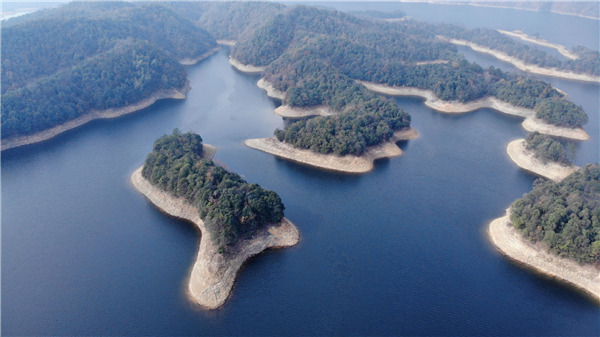
Aerial view of Taiping Lake in Huangshan, East China's Anhui province. (Photos: Xinhua)
Owing to relaxed travel restrictions, Chinese people exhibited zest for outdoor experiences over the three-day holiday for Tomb-sweeping Day that ended Monday, cramming tourist spots.
Early on the morning of April 5, the operator of the Huangshan mountain park in eastern China's Anhui province released three Sina Weibo posts, advising tourists against entering the scenic spot on that day as the park had become too crowded.
In Shanghai, the downtown Century Park in Pudong New District had its online tickets sold out for the holiday, a time for Chinese people to pay tribute to the deceased and worship their ancestors as well as to enjoy the outdoor greenery in spring.
According to a report by Meituan Dianping, a leading Chinese tech giant offering online vacation booking, the number of hotel rooms booked on its platform over the three-day holiday had rebounded to 90 percent of that over the same period last year.
After a lengthy stay at home owing to the coronavirus outbreak, Chinese people showed eagerness to travel and pay for tours and outdoor experience.
Zhan Dongmei, head of tourist spot studies with the China Tourism Academy, said as the COVID-19 epidemic had not come to an end and the whole nation faced risks of imported cases, tourist safety and health were the top concern in resuming domestic tourism sector.
A one-size-fits-all approach should be avoided when it comes to stimuli for tourism resumption, experts suggested.

Hainan Tropical Forest National Park.
Tourist and cultural venues should guard against mass gathering fuelled by policies like exempting entrance tickets, and public venues like parks should extend open hours to meet public demands for outdoor activities, said He Jianmin, a professor from the Shanghai University of Finance and Economics.
He suggested tourist destinations leverage the Internet to optimize management. Information technologies can be used to solve specific problems including predicting tourist traffic and managing tourist flows to ensure visitors' safety, he said.
In eastern China's Zhejiang povince and the south island province of Hainan, vouchers were distributed to boost tourism. Online booking of tickets were encouraged.
As spring comes and travel restrictions still exist to some extent, Chinese people are developing an appetite for online cultural experience.
In Beijing, the Palace Museum live streamed its palaces and vermilion walls shimmering in the spring sun to more than 400,000 online viewers over the holiday.


